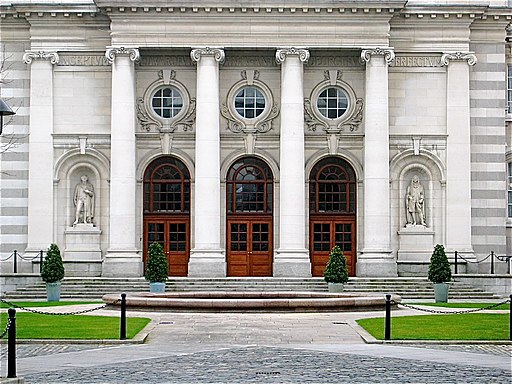In the last few weeks, I have written here about Friday’s election on three occasions. I make no apology for what I have written. The first piece was about the real reasons to be wary of Sinn Féin, the second about the dangers of a phoney competition between Fine Gael and Fianna Fáil, who the majority of people want to govern together in coalition, and the third piece was about the illusory Fine Gael strategy based on a claimed “new energy” and a raft of gimmicky auction politics that ignored our economic vulnerabilities. None of these required the assistance of a crystal ball.
When I posed the question last week whether there was an adult in the room, it wasn’t meant as jocose or patronising. It seemed – and still does – that Simon Harris had surrounded himself with inexperienced advisers concerned with media appearance and shape-throwing. Spending the first part of the three-week election campaign knocking the Fianna Fáil party must have been a deliberate, if cack-handed, decision taken at the top level within his campaign team. It ignored the reality that most people really don’t care that much who is Taoiseach as opposed to whether the country is in safe hands.
Observers have commented that Harris has faced an uphill battle arising from the departure from political life of half his incumbent TDs. This set me thinking as to precisely why that mass exodus occurred. Was it wise, on assuming party leadership, to put the gun to the heads of his TDs to declare unequivocally whether they intended to contest the next election? Could that not have been left uncertain, to deal with emerging political scenarios?
The sudden departure, post the family and care referendum debacles, of Leo Varadkar gave rise to a strange situation in that Harris had been preparing for such a change while the alternatives, including Paschal Donohoe, had not. Was the uncontested leadership vacancy a sign of collective party burnout? Was Harris so obvious a choice that nobody saw any alternative? Did the party confuse voter relief at the departure of Varadkar with real voter attachment to his successor? What was the “new energy”? A different approach to housing, health, hate speech or immigration? Or the appearance of some or all of the foregoing?
There will be plenty of time to examine these issues in the coming months. But as polling day approaches, one has an uneasy feeling that political opportunism, inexperience and immaturity have opened the door to an election result replete with uncertainty.
Opinion polling in multi-seat proportional representation Ireland can be misleading. Asking people, a sizeable portion of whom will not actually vote on Friday, to choose a political party, rather than among particular candidates known – or unknown – to them, is a little problematical. Being confronted with a ballot paper on which many new names appear is a daunting experience – especially for those who only follow the process at a distance. All-important second and lower preferences are choices that pollsters cannot reliably measure in national polls.
It seems to me that housing policy is hugely important to many voters. I was struck by the Fianna Fáil gambit of reopening the way to one-off house building on family farms. To long-term Dublin residents, that may not seem like much. But buried within that policy is a conscious rejection of what has been a cornerstone of Green Party orthodoxy – that we should be obliged increasingly to reside in towns on grounds of sustainability. In rural Ireland such policies are seen as the death knell of communities that cannot keep GAA clubs, smaller primary schools and smaller retail outlets alive. The argument for population concentration rings hollow there.
While housing is cited as more important than migration and refugee issues in surveys, there is a link between these issues. If we continue to receive 30,000 asylum seekers each year, all in addition to conventional economic migrants invoking EU travel rights and others granted work visas, and extend family reunification rights to all such migrants, what real hope is there of addressing the existing housing deficit of 250,000 houses by policies aimed at 50,000 new home builds a year?
I was struck by a passage in Home, Eoin Ó Broin of Sinn Féins’s book on housing. On page 187 it argues that lessors should lose the right to recover possession of properties, whether for resale or for occupation by the lessor or family members, and proposes that lessees should as a matter of fundamental principle in future “remain in situ for as long as they require subject to meeting the terms of their tenancy”. That would spell the end of much of the private rented sector.
Coupled with Sinn Féin’s aim for the State to be ground landlord of an ever-increasing share of future home builds, restricting the rights of occupants to dispose of them, there is much in their ideological small print that requires us to be wary.

